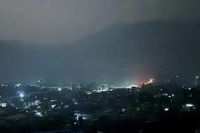Tensions between India and Pakistan have escalated dramatically following a deadly terrorist attack in Indian-administered Kashmir and subsequent military exchanges. On April 22, 2025, a horrific attack targeting tourists near Pahalgam resulted in the deaths of 26 individuals and injuries to 17 others. This incident marked a significant turning point, as it was the first time a terrorist attack specifically targeted tourists in the region, further complicating the already fraught relationship between the two nuclear-armed neighbors.
In response to the attack, the Indian government launched 'Operation Thunderbolt' on May 7, 2025, aimed at what it described as terrorist infrastructure in Pakistan and Pakistan-occupied Kashmir. Indian officials stated that the operation targeted nine locations believed to be involved in planning and directing terrorist attacks against India. However, they emphasized that Pakistani military installations were not targeted during the operation.
Pakistan's government reported that the Indian military launched missiles at multiple locations, including areas within Pakistani-administered Kashmir and Punjab province. The attack resulted in at least three civilian deaths, including a child, and injuries to fourteen others. Major General Ahmed Sharif, a spokesperson for the Pakistani military, condemned the attacks as 'indiscriminate' and aimed at innocent civilians.
In retaliation, Pakistan vowed to respond to India's military actions 'at the time and place of its choosing.' Prime Minister Shehbaz Sharif stated that Pakistan reserves the right to respond strongly to what he characterized as acts of aggression by India. Reports from Pakistani media indicated that the military had already launched retaliatory missile strikes on targets within India and claimed to have shot down two Indian fighter jets.
The international community has expressed grave concerns over the escalating tensions between the two nuclear powers. The UN Secretary-General's spokesperson urged both nations to exercise maximum restraint to avoid further escalation. The situation is particularly alarming given the history of conflict between India and Pakistan, particularly over the disputed region of Kashmir.
The Kashmir conflict has its roots in the partition of British India in 1947, which led to the creation of India and Pakistan. The princely state of Kashmir, with a majority Muslim population, became a focal point of contention. Initially, the ruler of Kashmir sought to remain independent, but following an invasion by forces supported by Pakistan, the ruler chose to accede to India. This decision sparked the first Indo-Pakistani war, which lasted from 1947 to 1948 and ended with a UN-mediated ceasefire that left the region divided between the two countries.
Despite various attempts at peace, including the Simla Agreement in 1972, which established the Line of Control (LoC) as the de facto border, tensions have remained high. The region has seen numerous conflicts, including wars in 1965 and 1971, and a persistent insurgency that began in 1989, fueled by calls for either independence or merger with Pakistan.
The situation worsened in August 2019 when the Indian government revoked Article 370, which granted special autonomy to Jammu and Kashmir. This move was met with widespread protests and increased violence, as the population, primarily Muslim, expressed dissatisfaction with Indian rule. The Indian government claimed that the revocation would lead to increased tourism and stability, but violence and terrorism have persisted.
In addition to the military confrontations, the two countries are also engaged in a dispute over the Indus River system, which is crucial for Pakistan's water supply. India has recently suspended the Indus Waters Treaty, which regulates the sharing of river waters, leading to accusations from Pakistan of acts of war. Pakistan relies on the Indus River for approximately 80% of its water resources, making the situation particularly precarious.
As of now, both countries have closed their airspace, and small-scale skirmishes along the LoC have continued for over ten days, raising fears of a larger conflict. The situation remains volatile, with calls for diplomatic solutions overshadowed by military posturing and accusations.
The Kashmir conflict is a complex issue, deeply rooted in historical grievances, national identities, and geopolitical interests. As both nations continue to exchange hostilities, the international community watches closely, hoping for a resolution that can prevent further loss of life and promote peace in the region.

![[속보] 인도, 카슈미르 등 파키스탄 9곳에 미사일 폭격 - 매일경제](https://thumbor.evrimagaci.org/2B3MpuWLJw2sm2UILz1tXR3QNDc=/200x0/tpg%2Fsources%2Fbdfd67ea-5de6-43e8-a14e-2bc466a87d21.jpeg)



